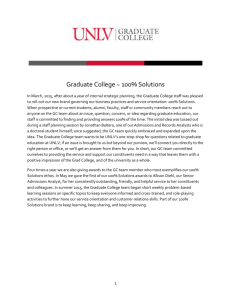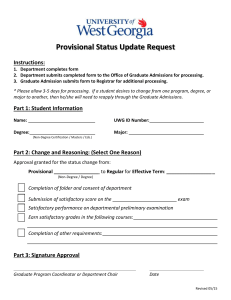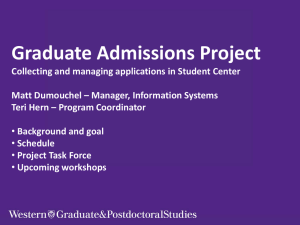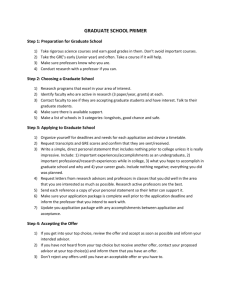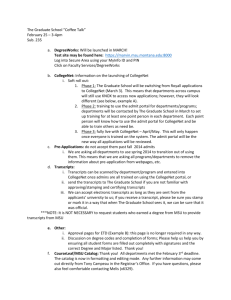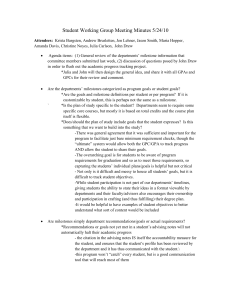Student Working Group Meeting Minutes 5/10/10 Attendees: Krista
advertisement
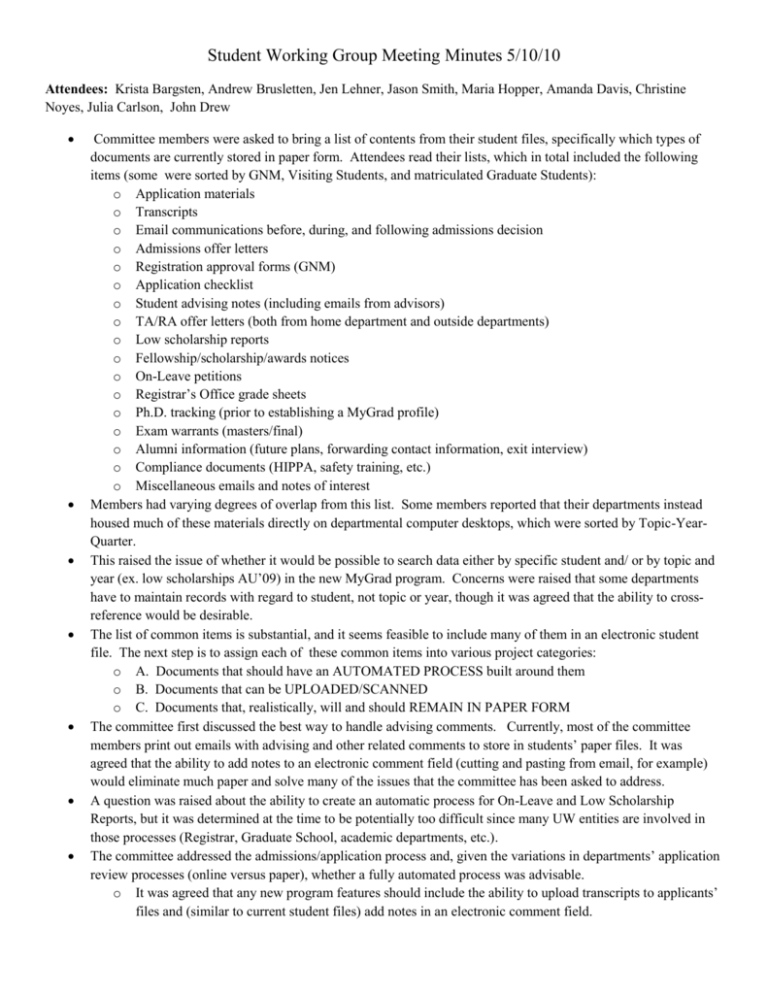
Student Working Group Meeting Minutes 5/10/10 Attendees: Krista Bargsten, Andrew Brusletten, Jen Lehner, Jason Smith, Maria Hopper, Amanda Davis, Christine Noyes, Julia Carlson, John Drew Committee members were asked to bring a list of contents from their student files, specifically which types of documents are currently stored in paper form. Attendees read their lists, which in total included the following items (some were sorted by GNM, Visiting Students, and matriculated Graduate Students): o Application materials o Transcripts o Email communications before, during, and following admissions decision o Admissions offer letters o Registration approval forms (GNM) o Application checklist o Student advising notes (including emails from advisors) o TA/RA offer letters (both from home department and outside departments) o Low scholarship reports o Fellowship/scholarship/awards notices o On-Leave petitions o Registrar’s Office grade sheets o Ph.D. tracking (prior to establishing a MyGrad profile) o Exam warrants (masters/final) o Alumni information (future plans, forwarding contact information, exit interview) o Compliance documents (HIPPA, safety training, etc.) o Miscellaneous emails and notes of interest Members had varying degrees of overlap from this list. Some members reported that their departments instead housed much of these materials directly on departmental computer desktops, which were sorted by Topic-YearQuarter. This raised the issue of whether it would be possible to search data either by specific student and/ or by topic and year (ex. low scholarships AU’09) in the new MyGrad program. Concerns were raised that some departments have to maintain records with regard to student, not topic or year, though it was agreed that the ability to crossreference would be desirable. The list of common items is substantial, and it seems feasible to include many of them in an electronic student file. The next step is to assign each of these common items into various project categories: o A. Documents that should have an AUTOMATED PROCESS built around them o B. Documents that can be UPLOADED/SCANNED o C. Documents that, realistically, will and should REMAIN IN PAPER FORM The committee first discussed the best way to handle advising comments. Currently, most of the committee members print out emails with advising and other related comments to store in students’ paper files. It was agreed that the ability to add notes to an electronic comment field (cutting and pasting from email, for example) would eliminate much paper and solve many of the issues that the committee has been asked to address. A question was raised about the ability to create an automatic process for On-Leave and Low Scholarship Reports, but it was determined at the time to be potentially too difficult since many UW entities are involved in those processes (Registrar, Graduate School, academic departments, etc.). The committee addressed the admissions/application process and, given the variations in departments’ application review processes (online versus paper), whether a fully automated process was advisable. o It was agreed that any new program features should include the ability to upload transcripts to applicants’ files and (similar to current student files) add notes in an electronic comment field. o It was also agreed that the application file should be merged to the student file once an applicant has become a registered UW graduate student. o In summary, if the Graduate School were able to (1) merge the application file to the student file, (2) scan transcripts centrally, and (3) create an electronic comment field, this would be a huge piece of the current student file that would no longer need to be managed by the academic department. The remaining items that were discussed were TA/RA offer letters, scholarship/fellowship information, and other department-specific materials. The Graduate School cannot customize a program for each academic department, so it was asked if the committee members thought GPAs/GPCs would take the time required to scan and upload these documents into MyGrad should this function be available. The committee members strongly agreed, though some expressed concern about the lack of hard copies for situations such as exams and referencing files in locations without internet access. A related question was asked: “What are the benefits of an electronic (vs. paper) student file? That answer has be compelling enough to convince people to move away from paper files.” o Answer: (1) it increases access for other department members, (2) it is time- and place-independent, allowing access anytime and anywhere, and (3) it provides for flexible indexing (searching by student, topic, year, or quarter). o The committee discussed concerns about “push back” and the need to be sensitive to departments’ needs and the consequences of changing current processes -- many people don’t like to read a lot of content online ( paper might be preferable to some), and some departments’ have resource issues with regard to printing large application documents, etc. o The committee was reminded that its goal is to determine WHICH documents we want and generally HOW we want to use them, and that the Graduate School will later flush out the usability details and determine how to accommodate existing processes. Ultimately, it’s unlikely that changes would be mandated as a “new rule”. The committee then addressed student access to their electronic file. o It was generally perceived as a benefit for the student to see their file, as they might become more involved and educated in their own academic profile and progress. o There is even the potential for students to contribute to their own file, such that they can participate in the creation of their academic profile (similar to uploading admissions materials in electronic admissions files). o A major concern was protecting certain private materials or comments from student view. The committee agreed that allowing students to view their files would be beneficial only if advisors had the ability to selectively choose “available to student view” and “not available to student view” for all materials in the file. The committee members agreed that they would each gladly take the time to classify each uploaded document or comment field as “available” versus “not available.” It was suggested that the program could be designed with a “not available” default to guard against oversight. o There was less agreement on whether faculty should be able to directly classify their own submissions, or whether all materials should be classified by the GPC/GPA. The committee then discussed access issues for advisors outside the students’ home department – would it be like EARS where all advisors could see all comments, or like the current MyGrad where GPAs/GPCs can only view their own students? o It was argued that if the file was indeed an attribute of the student and NOT the department, that the file should be viewable by all relevant departments ( for example, in the case of concurrent degree students). Alternatively, perhaps a simple request for access to the home department would be sufficient. o A secondary issue is whether the Graduate School itself should be able to view and post comments as well. The committee was asked to prioritize which 3 items were most important to include in an electronic student file (given possible limitations on time, resources, and storage capacity at the Graduate School): o Advising notes/comments field o Admissions file o Academic progress tracking o Advisor search o (secondary priority given to listing committee assignments for Master’s Degree programs) It was asked if at this time the committee/Graduate School should invite faculty into the process of defining an electronic student file and its use. The committee said no, citing that those members present were a good representation of the various UW academic departments and that as GPAs, we were savvy to what both faculty and students needed from an electronic student file. It was confirmed that using EARS’ already-established comment function was not an effective substitute for creating a comment function in MyGrad. Most graduate advisors said they used EARS only to obtain unofficial transcripts, and they would rather use MyGrad to access unofficial transcripts (assuming that they could be improved to be more detailed). The minutes from last week’s meeting were amended to include “students” in the list of MyGrad program users. The agenda for next week’s meeting will focus it’s second project – tracking student progress in MyGrad. For next week, committee members are asked to consider the following: o What do you currently track (internally in the academic department) with regard to student progress (courses, exams, etc.)? o What are the different levels of progress? o Who would be the users of a tracking system (who will enter data, who can view it)? o What might a tracking system look like? Should we ask to see models from other universities (or our own UW School of Education’s system) at a future meeting? The committee’s next meeting is scheduled for Monday, May 17th at 9am.
